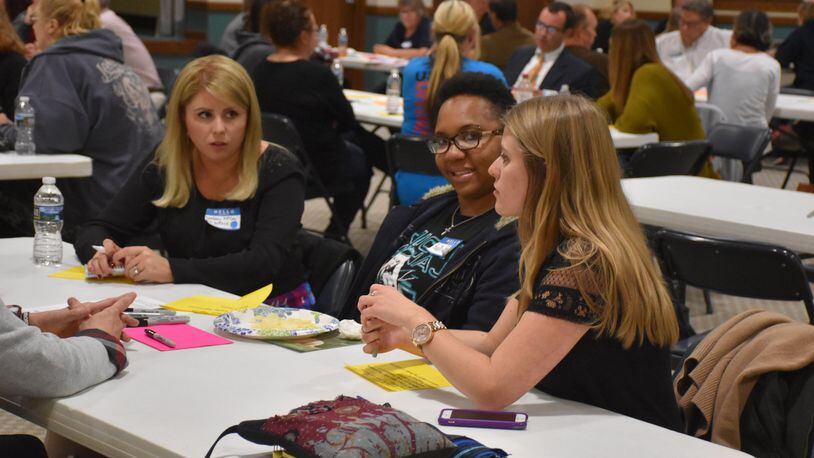Some of the sessions, including the one in Dayton, are full, though waiting lists are available. And anyone can attend a session with open spots. Those wishing to attend should RSVP online at Eventbrite.com and search for Your Voice Ohio. The sessions are free.
RELATED: Premier launches social media campaign against opioid addiction
Your Voice Ohio is a collaboration of more than 30 Ohio news organizations, including the Dayton Daily News, Journal-News and Springfield News-Sun. The organizations first combined resources on issue-oriented coverage during the 2016 presidential election. The effort included listening sessions with voters and public opinion polling that helped the organizations focus their coverage on the issues that matter most to Ohioans.
After the election, the group decided to continue collaborating on issues that touch all Ohioans. Opioids was an obvious choice.
Trends indicate more than 4,000 Ohioans could die this year due to drug-related overdoses. That's more people in one year in one state than died of terrorism attacks in the entire country in the past 20 years.
RELATED: Media to hold forums on Miami Valley drug crisis, examine solutions
Many people are making heroic efforts in combating the opioid crisis, and it has the attention of lawmakers from Washington to tiny villages throughout Ohio. The forums are designed to add to those conversations, not replace them.
Each forum will begin with the assumption that communities are best equipped to identify and act on effective solutions. The format includes small-group discussions in which participants can remain anonymous if they wish. The goal is to involve the community in a conversation so that more people understand what many experience on a daily basis. And to involve more people in fighting to bring the crisis under control.
The opioid crisis has been a story of devastation. The goal here is help change the conversation to one of action and perhaps hope.
RELATED: Drug crisis in Ohio: What solutions are making a difference?
More about Your Voice Ohio
The Your Voice Ohio project was initially funded in 2016 by a $175,000 grant from the John S. and James L. Knight Foundation, an organization that supports journalistic endeavors. That funding provided for unique polling for the media by the University of Akron Bliss Institute for Applied Politics and public deliberation sessions facilitated by the Jefferson Center, a nonprofit, nonpartisan engagement organization in St. Paul, Minn.
In 2017, the Democracy Fund, which supports media and public engagement in democracy, provided $250,000 to advance the work, and the Knight Foundation provided another $75,000.
The Jefferson Center continues to organize the public conversations and acts as the fiscal agent for the project. Doug Oplinger, a 46-year veteran of the Akron Beacon Journal who worked on three Pulitzer projects, manages the media work.
Forums on opioids
The opioid crisis continues to impact lives across our region and Ohio. This newspaper will host forums throughout the region to address the issue as part of the Your Voice Ohio project. All sessions are free to attend, but because of limited seating, people are asked to RSVP online on Eventbrite.com and search for Your Voice Ohio.
Some sessions are already full, but others still have slots. Also, waiting lists are available on the Eventbrite site.
Dayton — 2 p.m. Sunday, Feb. 11, Main Library, 215 E. Third St.
Middletown — 6:30 p.m., Monday, Feb. 12, MidPointe Library, 125 S. Broad St.
East Cincinnati — 6:30 p.m., Tuesday, Feb. 13, Madisonville Recreation Center, 5320 Stewart Ave., Cincinnati.
Wilmington — 1 p.m., Sunday, Feb. 18, Wilmington Municipal Building, 69 N. South St.
Washington Court House — 6:30 p.m., Monday, Feb. 19, The Lafayette Room, 133 S. Fayette St. South.
Need help right now?
Crisis hotline: Dial 2-1-1 to be connected to mental health and addiction services in Montgomery, Greene, Preble, Clinton, Warren, Butler, Champaign, Clark and Madison counties. In Miami, Darke and Shelby counties, the 24-hour crisis hotline number is 1-800-351-7347.
Needle exchanges: By exchanging used syringes for new IV drug users are less likely to develop infections or contract HIV or hepatitis C. Each time there is an exchange, a health official has an opportunity to provide counseling; and each time a needle is returned, that's one less potentially deadly object in a fast-food parking lot or park. No exchanges are available in Clark or Champaign counties. Exchanges can be found at the following locations:
Montgomery County CarePoint, 937-496-7133, phdmc.org
Vogel Health Center, 6175 W. Third St. in Dayton on Tuesdays from noon to 5 p.m.
Mt. Olive Baptist Church, 502 Pontiac Ave. in Dayton on Thursdays from 9 a.m. to 3:30 p.m.
Life Enrichment Center, 425 N. Findlay St. in Dayton on Fridays from 9 a.m. to 3:30 p.m.
Cincinnati Exchange Project, serving Butler County, 513-316-7725
Greene County SafeTrade, 937-374-5600, Fridays 1 to 4 p.m., 600 Pierce Drive in Fairborn.
About the Author
